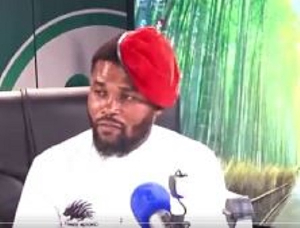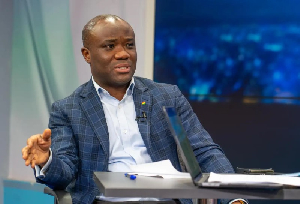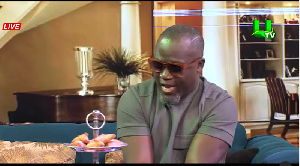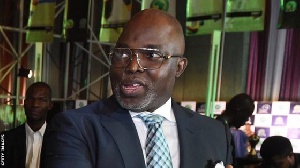As counsel for the National Democratic Congress (NDC) in the recent Election Petition trial (EPT), Mr. Tsatsu Tsikata should be very contented with victory for his client. But, whereas even the losers have forsworn their right to a review of the Supreme Court (SC) verdict, Mr. Tsikata has decided he hasn’t quite had enough yet.
In the process, he is fast exposing his real motives for being part of the EPT. In recent remarks on TV3’s Hot Issues (Saturday, Aug. 31, 2013), a talk show hosted by Mr. Kwesi Pratt, Mr. Tsikata made so many tasteless, ungraceful claims that cannot be allowed to go unanswered.
CLAIM 1- JUSTICE ANIM-YEBOAH IS BIASED AGAINST THE NDC & TSIKATA:
Evidently, Mr. Tsikata saw the trial as payback to anyone who so much as remotely played a role in jailing him for causing financial loss to the state. Besides attacking Justice Anim-Yeboah for allegedly showing bias against the NDC's cause, he also attacked Ms. Gloria Akufo for failing, as a former student of his, to take her studies seriously and, therefore, lacking proper understanding of the law.
Mr. Tsikata’s charge against his former student includes her alleged failure to understand his reference to “retroactive penalisation” during the EPT and “retroactive legislation” during his own trial for causing financial loss to the state. As then Deputy Attorney-General, it was Ms. Akufo who signed the charge sheet on the latter trial. But, in this recent interview with Mr. Pratt, Mr. Tsikata didn’t appear to have taken his own lesson notes seriously enough.
Lawyers, we’re told, are taught to disagree with the decisions of judges, if they feel like it, but to do so in a manner that doesn’t impugn the integrity of the justices or that of the court. Yet, by his own accusations, Mr. Tsikata is not only impugning the person of Justice Anim-Yeboah, but also opening the floodgates for unnecessary commentary on perceived political biases of the other justices, including all those who voted against all six of the petitioners’ claims.
Incidentally, Justice Anim-Yeboah voted along with everyone else on the panel to dismiss three of the petitioners’ claims, which together contained the largest number of votes in contention. So, how can Mr. Tsikata single out Justice Anim-Yeboah for showing open bias to the NDC’s cause unless he has a very personal axe to grind? Are we to understand by Mr. Tsikata’s claims that what we heard on Thursday, August 29, was a Supreme Political Verdict instead of a Supreme Legal Verdict?
CLAIM 2- I'M BETTER THAN PETITIONERS' COUNSEL
Referring to a response by counsel for petitioners to his arguments in court, Mr. Tsikata also claimed that "quite frankly I have a better grasp on these legal matters". He based his claim on two points. One is that nearly all the members of the petitioners’ counsel were his students. Mr. Tsikata even spoke of them as his students in the present tense, as if to suggest that he still sees them as his students rather than as colleague lawyers. The other is that he has been teaching law for over 40 years.
Besides his shameless boastfulness, Mr. Tsikata’s thinking here is, “quite frankly”, offensively illogical, even anti-academic. That an opponent counsel was once your student, and you've been studying and teaching law for over 40 years, doesn't necessarily make you any more knowledgeable. In fact, in the same interview, Mr. Tsikata was caught off guard when he was asked to explain the difference between "criminal contempt" and "civil contempt".
He did a poor job of the question, and, realising he had fudged his response, quickly added with jest that that's what he could remember. But I've heard much younger lawyers give far more superior answers to the same question. Mr. Tsikata must know that he is not the only Ghanaian who had a first class at Legon and subsequently made it to Oxford or some other world class or Ivy League school. These days, that's a well-trodden path for many young Ghanaians.
CLAIM 3- RETROACTIVE PENALISATION:
In the case of the EPT, Gloria Akufo was right that there is no such thing as “retroactive penalisation” in cancelling votes because the law upon which the petitioners were praying the court to make the annulment already existed at the time of the elections. That most voters were ignorant of the law, as most of us are of many laws governing public conduct, is quite beside the point. Indeed, while intent affects the weight of a judgment, it's a basic principle of law that ignorance is no excuse.
Upon request by Justice Atuguba, Mr. Tsikata attempted an explanation of his use of the term. His whole point was that voters cannot be punished for the failure of electoral officers to perform a public duty, such as signing the pink sheets. If that's the case being made, and it's hardly a sound one, although the petitioners were equally not very convincing, then what Mr. Tsikata actually meant to say was “vicarious penalisation”, NOT “retroactive penalisation”.
Why did Mr. Tsikata get his phraseology wrong? A plausible answer is that ever embittered over his supposedly wrongful imprisonment for causing financial loss to the state, the man wanted to prove a point by using the same strategy to win the EPT, as if doing so would, somehow, also prove his innocence in the matter of causing financial loss to the state. In other words, Mr. Tsikata probably knew that the term was a wrong turn of phrase in the context of the EPT, but it was his rhetorical device to highlight by association what he thinks was an injustice done him in his own conviction.
After his trial had travelled all the way up to the SC and ended in a SC review that sent him to jail, Mr. Tsikata may feel that he has very limited options in using a retrial to prove his innocence. A review of the SC review, for example, is most unlikely. Thus, the true value of Tsikata’s claims of “retroactive penalisation” in the EPT has to be judged not by its contribution to the respondents’ case, but by its “propaganda value” for Mr. Tsikata’s own efforts at self-rehabilitation.
Mr. Tsikata is, however, right that Justice Anim-Yeboah may have erred in citing IMF’s Articles of Agreement to justify why the IFC could not be subpoenaed. The IFC is a member of the World Bank Group, not of the IMF. The SC Justice should more appropriately have cited IFC/World Bank Articles of Agreement. Still, doing so would have had the same effect. Officials of both Bretton Woods institutions, as members of the UN system, derive their immunity from the 1946 UN Convention on Privileges and Immunities.
Besides, whatever an IFC official would have had to say about the commercial viability of the project couldn’t have expunged the crucial fact that Mr. Tsikata, as Chief Executive of GNPC, had no mandate to so commit the state in guaranteeing a loan for a private firm, which firm then defaulted, thereby compelling the Ghanaian state, as owner of GNPC, to assume a private firm’s debt obligations. Mr. Tsikata’s only luck lay in successfully proving his much more relevant claim on “retroactive legislation”. It’s unfortunate that he couldn’t.
Even so, Mr. Tsikata can seek any legitimate means, including propaganda, to clear his good name without resorting to these rather bathetic post-judgment attacks on Justice Anim-Yeboah. “Quite frankly”, that’s in Contempt of Fairness and Decency.
General News of Monday, 2 September 2013
Source: p. k. henderson [hendersonpka@gmail.com]

















